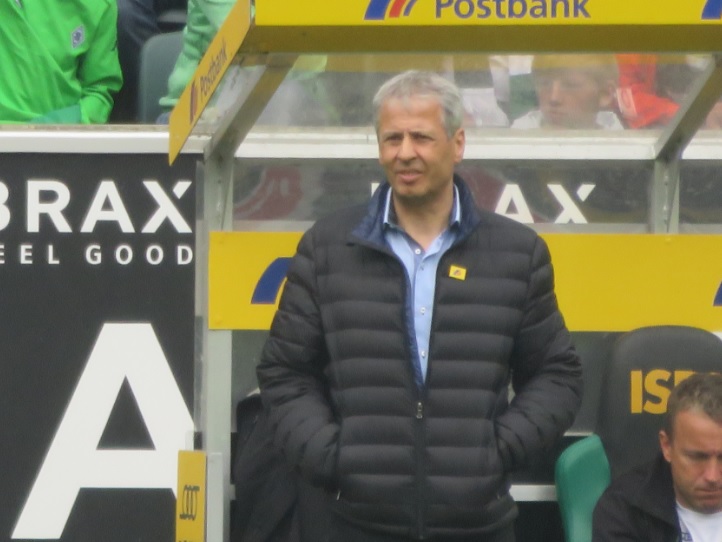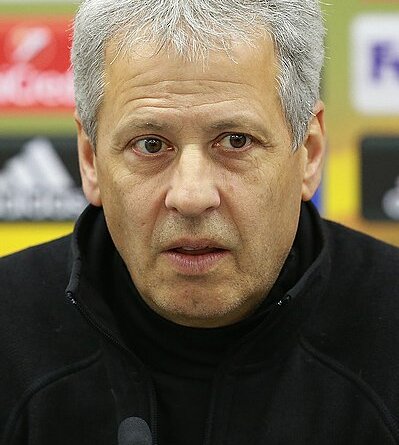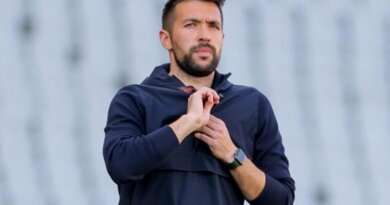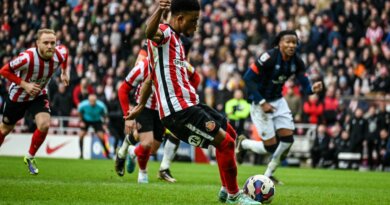Lucien Favre to Newcastle: A look at his career so far

Lucien Favre is one of the favourites to land the vacant Newcastle job, with odds as short as 5/2 according to bookmakers seemingly justifying a strong chance of being appointment.
According to German outlet Bild, negotiations are said to have entered a “decisive stage” as the Newcastle consortium decide shortly what manager path to take.
In the context of the club’s ongoing relegation fight it is crucial to know what Favre could bring to the club when the immediate concern is not to build a team challenging up the league but rather simply to stay apart of it.
SportsByte had a look at Favre’s existing managerial career and contemporary judgments to ascertain whether he would be as good a fit as some supports have claimed.
Yverdon-Sport
Favre’s first notable manager’s job came with a small club from Yverdon-les-Bains in the west of Switzerland called Yverdon-Sport in January 1997.
The team was said to have been struggling at the bottom of Nationalliga B when Favre was appointed, which was the second-top division in Switzerland at the time.
A year earlier, Yverdon-Sport finished second in the initial qualifying stage (there were 12 teams in the division) but fifth in the promotion group.
With the club struggling as it was, Favre transformed the team.
Yverdon-Sport finished fifth at the end of the 1996/97 season, picking up 35 points. FC Meyrin and FC Gossau, the teams that finished 11th and 12th respectively, finished with 10 and 16 points respectively to put the team’s transformation into context.
By 1999 the team were promoted to Switzerland’s top division and even qualified for the championship play-offs in their maiden season.
They finished bottom with 22 points in the championship play-offs but finished a very respectable 5th in the qualifying stage.
The 1999/2000 season still ranks as Yverdon-Sport’s highest-placed finish: the club now find themselves in the second division (Challenge League) having won promotion from the third division (Promotion League) in Switzerland last season.
As a small consolation to Yverdon-Sport, the 30 points they picked up in 22 games in 1999/2000 would not have been enough to escape the relegation play-offs the season after, as Zurich in 8th finished on 31 points.
Steeve Devolz played under Favre not only at his first job in Echallens (when they “earned a historic promotion to the second tier in 1994” according to These Football Times), but also at Yverdon-Sport to secure promotion in 1999.
He said: “As a young footballer, Favre’s coaching made me feel strong. He made me feel like I could achieve great things. My times under him were the best of my career.”
An article by Mondo Futbol wrote of his spell: “Favre built this masterpiece through a massive turnover (in the first season he substituted 14 players on 18) and hard work.
“He explained his football idea made of ball possession, speed, intensity and organisation every day. As his former player Ludovic Magnin said, Favre indoctrinated him also on a car that brought him home.
Servette
Favre played for Servette as a player in two spells between 1981 and 1991. It’s fair to say this was where he made his name as a player, but also later as a manager.
He inherited a side that escaped Switzerland’s relegation play-offs by two points in 2000, even surpassed by his own Yverdon-Sport side that played its first top-flight campaign that year.
And in two seasons he took the team to 6th (finishing on 33 points, and qualification to the UEFA Cup first round, by recording 37 points in the resulting championship play-offs) and 5th, securing UEFA Cup qualification for yet another season.
A 40% win record doesn’t tell the complete story because he won the Swiss Cup in 2000/01, ironically facing his former side Yverdon-Sport in the final in which Favre’s side won 3-0.
After losing out in their previous three finals (1996, 1987 and 1986) it was surely relief for Favre to end his quest for cup silverware having lost out multiple times as a player.
Despite qualifying for the last 16 of the UEFA Cup in 2001/02, a “difference in opinion over the club’s sports’ strategy” forced Favre to leave at the end of that season.
According to UEFA: “In a statement, the club said: “Lucien Favre and Servette FC decided, by mutual agreement, to put an end Lucien Favre’s function as trainer. The shareholders and the board of directors of Servette FC thank Lucien Favre for the excellent results obtained during these two last seasons.”
Mondo Futbol added: “Good-mannered and extremely shy, he doesn’t want to settle for a compromise and he is not so distant as it seems. After the two-years spell in Geneva, the Swiss manager opted for a one-season break. He studied the way of coaching of different European managers and in 2003 Favre was appointed as FC Zürich‘s head coach.
Zurich
Zurich had come off the back of a 5th placed finish in 2002/03 and Favre was appointed head coach the following year, having taken a sabbatical to rest after Servette.
It is fair to say Zurich was a big success for Favre, as the club won two Swiss Super Leagues in 2006 and 2007, and a further Swiss Cup in 2005.
Mondo Futbol wrote: “His team won one Swiss Cup and two Swiss championships, the first one in 2006 by beating Basel FC in the last match and ending a 25-year drought.
“In addition to these trophies, it was incredible how the Swiss coach made his players improve.
“New training methods, organisation, an offensive football style and a lot of young footballers promoted to regular first team members, for example Gökhan Inler and Blerim Dzemaili.
UEFA.com said: “The Super League had rarely witnessed the level of attention to detail the 24-times capped Switzerland midfielder put into his team’s matches.
“Training sessions and detailed analysis of opponents helped to give Zürich their edge, with defensive awareness and anticipation key elements which Favre drilled into his troops.
Zurich’s 2006 league win came in spectacular fashion: Basel played Zurich on the final day with the former three points ahead.
A last-minute goal scored by Iulian Filipescu secured Zurich their first title win since 1981 – and subsequent riots named the “Basel hooligan incident” marred the last-day defeat for Basel, with the teams separated by only five goals (goal difference).
It was the season’s highest attended match; 32,712 attended a fully-packed St. Jakob-Park.
A close title race the following year ensued, as Zurich lifted the league with only one point separating Basel and Zurich.
Favre left Zurich in a far greater position than what he inherited, with a win percentage of 55%.
Speaking to UEFA.com, Favre said of his time in Zurich: “I had a fantastic time at Zürich – those four years were like a dream.
“A lot of great memories flood back when I think about those days.
Almen Abdi played under Favre while at Zurich and he told The Athletic: “He’s an excellent coach who’s very obsessed with details.
“Everything has to be right, including training, and he knows exactly what the strengths and weaknesses of every player are.
“He also studies the opponents very well.”
Favre was awarded the Swiss Manager of the Year accolade for the second time a row, having clinched back-to-back championship wins.
Hertha BSC

A few days, on 1 June 2007, Favre swapped his native Switzerland for Germany as Hertha BSC appointed him head coach on a three-year deal.
Kicker reported: “Berlin is a big challenge for me,” he said in Zurich on Friday.
“It is my goal to always make progress. I expect the same from my players.”
Dieter Honess, general manager of Hertha BSC at the time, said: “He’s a great fit for Hertha BSC and Berlin, both athletically and personally.”
In his two years, he took the team from an inherited 10th to 4th which qualified Hertha BSC for the Europa League play-off round.
Mondo Futbol added: ” Another miracle made of good players (Croatian defender Simunic, Hungarian midfielder Dárdai and Ukranian striker Voronin), great organisation and intensive work on tactics.
“It’s the triumph of ‘polyvalence’, as Favre repeated over and over again in a decent German during his spell at Hertha.
“A concept explained by Swiss coach in an interview published on local newspaper Tageszeitung: ‘It’s not a matter of having footballers able to play in every position, but players able to perform well his favourite role in every formation‘.”
Speaking in 2008, UEFA.com reported Favre who said: “Since I came to Berlin a year ago many things have changed and we have had a lot of ups and downs.
“Building a football team is like baking. You need butter, sugar, flour and many other ingredients.
“It’s a question of getting the right mix.
“Too much of one thing and it tastes bad.
“Sometimes you have to try a few times to get it right.”
He was sacked six games into the 2009/10 season with the team left bottom following an abysmal six defeats in a row in the Bundesliga.
It must be conceded however, that the team suffered financial troubles and sold three of its top players that summer in Simunic, Coronin and Pantelic.
The team were relegated that season.
Borussia Monchengladbach
Perhaps most miraculous of any of the jobs Favre has taken, he inherited a side seven points adrift of the Bundesliga.
Within a year and a half that side was in the Champions League qualifying rounds having finished fourth in the league.
Mondo Futbol wrote: “The key principles of Favre’s play were the same as in Berlin and in Zurich: organisation (4-4-2 with double pivot as main formation), ball possession and speed.
“What changed were the players. Many of them came from Borussia youth academy, like Marc-André ter Stegen and Patrick Hermann, some others (Reus, Xhaka, Kramer) were signed by duo Favre-Eberl.
“The Swiss manager was really good in mixing them with club veteran Stindl and his pupil Raffael.
“The result of Favre’s work is one of the best teams in Borussia Mönchengladbach recent history.
“The former Hertha Berlin coach shaped his side day by day working hard on every single player and on every single detail of Fohlen‘s play.
When Favre resigned in 2015 because “he could no longer find solutions to our problems”, according to sporting director, Max Eberl, it is said to have “plunged” the club “into darkness.”
The Guardian reported Eberl commenting: “I’m just really sad this incredible time together has come to an end.
“He was the perfect coach for us and we were the perfect club for him.”
The report added: “It is all one fine mess, and especially disheartening if you remember the excitement that engulfed one of Germany’s best-supported clubs at the beginning of this season.
“The 2015-16 campaign was supposed to underline Borussia’s return to former glory days, not plunge them back into pre-Favre darkness.
Nice
Favre took the remainder of the 2015/16 season off but accepted a job with Ligue 1 side Nice, replacing Claude Puel who took the Southampton job in England.
He finished 3rd in his maiden season and 8th the year after, though relevant for Newcastle fans was his allegedly frosty relationship with fan-favourite, Allan Saint-Maximin.
GFFN had said: “Another Allan Saint Maximin anecdote: During his 1st training session after joining Nice in 2017, he so infuriated Lucien Favre that the Swiss tactician stormed off mid-session to his board, demanding that they sell him straight back to where he came from.”
Aside from the conduct alleged Favre fared well dealing with more controversial names for example, Mario Balotelli.
The Athletic said: “During his two years with Nice, he is credited with handling the immensely talented but mercurial Balotelli, and again, with improving him through one-to-one sessions. Their relationship was key.
“Balotelli has thrived for short periods at many of the clubs he has represented but has often been accompanied by a sense of self-inflicted turmoil.
“Under Favre at Nice, for a while at least, he seemed at ease and there were 33 goals from 53 league appearances over that two-year period.
Borussia Dortmund
Favre’s most recent position, he was appointed manager ahead of the 2018/19 season with a contrast scheduled to end in June 2020.
His Dortmund side were the subject of an Amazon Prime documentary called Inside Borussia Dortmund which reflected upon the 2018/19 campaign.
Dortmund finished 2nd that season, losing only one match in their first 23 games.
For much of the season they were top but were unable to hold on to win their first title in two decades – the title race was decided on the last game but a win against former side, Gladbach, was not enough.
Otto Addo who was his assistant at Dortmund, told The Athletic: “He loves working on players’ technique, especially with young players.”
He brought in 12 youngsters to the team including a youthful Jadon Sancho signed from Manchester City’s academy system, Jude Bellingham and Erling Haaland.
Dortmund were inconsistent to say the least and Favre was sacked shortly before the end of 2020, leaving a more-than-respectable 61% win record with him.
Fear The Wall, a fan-written publication dedicated to all things Borussia Dortmund, wrote about his dismissal: “Taken as a whole, Favre’s Dortmund teams were on track to surpass even the goal scoring exploits of the Jurgen Klopp golden years of 2011 – 2014.
“But where Klopp was famous for aggressive defense and direct attacking football, Favre’s teams chose patience at both ends of the pitch, which often frustrated the fans, and sometimes even the players.
“Favre has been famous to a certain type of fan for coaching teams that consistently score goals without taking a lot of shots and wreck everyone’s expected goals (xG) models.
“Analysts looking at xG have often pointed to Favre as an outlier, whose teams consistently overperformed. At the same time, they have questioned whether Dortmund could really keep beating xG by such incredible margins.
:no_upscale()/cdn.vox-cdn.com/uploads/chorus_asset/file/22206812/rankings.png)
“Dortmund’s attack showed signs of change before Favre was fired, seemingly taking a more direct approach, either out of necessity or to suit Haaland.
“This season Dortmund has taken more shots, with a greater xG than ever before, but without Favre’s trademark efficiency, which has resulted in the team scoring slightly less than its xG for the first time since Favre joined BVB.
“The end result is an overreliance on Haaland’s production. As a squad, Dortmund’s percentage of shots on target, goals per shot and goals per shot on target have plummeted, even as Haaland has put up incredible numbers.
“Haaland’s return won’t be in time to save Favre’s job and it doesn’t answer why the defense started underperforming a few games before Haaland’s injury.
Further, The New York Times questioned Dortmund’s decision to axe when things were on a blip.
Rory Smith said: “This is Dortmund’s system: to recruit blue-chip talents from across Europe – and occasionally further afield – and to expose them to elite soccer, in both the Bundesliga and the Champions League, earlier than might be possible elsewhere.
“It is that reputation for trusting and empowering youth that the club emphasizes in its sales pitch to prospective signings.
“And it was that approach that made Favre, in some senses, the perfect coach for Dortmund.
“The problem, of course, is that both are a little at odds with how the club perceives itself.
“Dortmund has more than enough quality in its squad to beat Stuttgart at home. Its team should not reasonably expect, for example, to find itself trailing Wolfsburg in the table, as it was when it changed coaches.
“Dispensing with Favre, by those simple metrics, was justifiable.
Post-Dortmund
Favre was credited with a move to Crystal Palace before they opted for Patrick Vieira, the deal allegedly was in its final stages.
But whether a move by Newcastle materialises we can’t be sure until firm concrete contact has been made.
His experience at Gladbach bodes especially well in the context of Newcastle’s relegation fight and fans would surely be delighted if he can replicate their fortunes.
His teams tend to overperform the expected goals model so it would be fascinating to see Favre’s philosophy in play in the Premier League.
Nevertheless, Favre remains a strong contender for the Newcastle job and is an option many fans, particularly those familiar with his work in Germany and in France, would wish for in a heartbeat.




